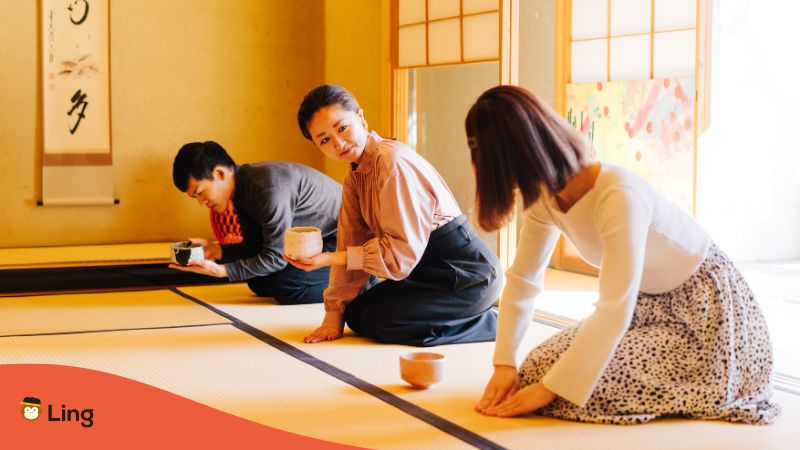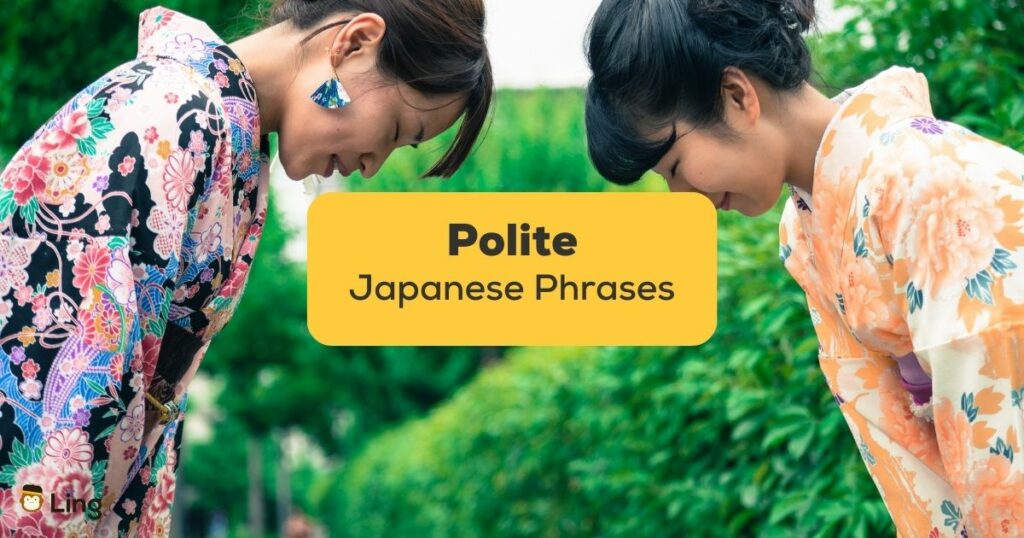Are you planning a trip to Japan soon? If so, there’s one crucial aspect of Japanese culture that you should keep in mind: politeness.
Politeness is incredibly important in Japanese society, and mastering the appropriate etiquette can make a huge difference in your interactions with the locals, who may not speak your native language. For example, when ordering food at a restaurant, using polite Japanese phrases can make the staff feel more respected and valued, leading to a more pleasant dining experience.
Politeness is a fundamental part of daily life for Japanese people, and it is essential to show respect for their customs and traditions, especially when communicating in the Japanese language. It is a central aspect of Japanese business culture, too. Also, if you’re lost and need directions, using polite language can help you receive more accurate and helpful information from Japanese people.
In this article, we’ll go over some must-know polite Japanese phrases that will help you navigate social interactions in Japan with ease and confidence. So, let’s get started and make your trip to Japan a more enjoyable and successful one!
Politeness In The Japanese Language
Japanese culture places a strong emphasis on politeness and respect, and using appropriate language is essential to building successful relationships. Using polite language is especially important In Japanese business situations, as you have to reflect your respect for your colleagues and clients.
Knowing some polite Japanese phrases can be very helpful when communicating with Japanese clients or colleagues, but remember that direct translation from your native language does not always work.
How To Sound Polite In Japanese
Whenever you want to sound polite, make sure to use the past tense in Japanese to show politeness and respect. It’s kind of like using the past modal “could” in English.
You can also use the suffix “-masu” or “-desu” at the end of a sentence to show respect and formality. Though they don’t change the meaning at all, they automatically make a sentence polite. Here are some examples of how to use these suffixes to make sentences more polite:
- すみません、遅れます。 (Sumimasen, okuremasu) – Excuse me, I’ll be late.
- 私は学生です。(Watashi wa gakusei desu.) – I am a student.

What Is The Politest Japanese Greeting?
The politest Japanese greeting is おはようございます (ohayou gozaimasu), one of the basic Japanese phrases, which translates to “good morning.” This phrase is considered the most polite because it shows respect for the time of day and uses a formal suffix “-gozaimasu” to indicate the polite version. It is a common greeting used in daily life and business situations when meeting someone in the morning.
In the evening, the phrase こんばんは (konbanwa), meaning “good evening,” is used. There’s also the polite version of “good night”: おやすみなさい (oyasumi nasai), which is commonly used before going to bed.
Using polite greetings like these is essential to showing respect and building positive relationships in Japanese culture.
What Is The Most Respectful Way To Say “You” In Japanese?
There are a few different words for “you” in Japanese to reflect a level of formality and respect in different social situations. One way to say “you” in Japanese is あなた (anata).
However, keep in mind that the use of “anata” can sometimes be considered rude and too direct. So, instead, it is more common to use a person’s name or title when addressing them, such as “san” or “sensei.” These titles sound more polite than the word “anata” when you address a person.
Polite Japanese Phrases You Must Know
Here are twenty polite Japanese phrases you must know, with their English meanings and romaji transliterations:
| English | Japanese | Romaji | Audio |
|---|---|---|---|
| Good morning | おはようございます | Ohayou gozaimasu | |
| Hello | こんにちは | Konnichiwa | |
| Good evening | こんばんは | Konbanwa | |
| Good night | おやすみなさい | Oyasumi nasai | |
| Thank you very much | ありがとうございます | Arigatou gozaimasu | |
| Excuse me / I’m sorry | すみません | Sumimasen | |
| Please | お願いします | Onegaishimasu | |
| Excuse me (used when leaving a conversation or a meeting) | 失礼します | Shitsurei shimasu | |
| Please (used when offering something) | どうぞ | Douzo | |
| Thank you for the meal (said before eating) | いただきます | Itadakimasu | |
| Thank you for the meal (said after eating) | ごちそうさまでした | Gochisousama deshita | |
| May I come in? / Excuse me (used when entering a room) | ごめんください | Gomen kudasai | |
| Excuse me for leaving before you (used when leaving a meeting or gathering before others) | お先に失礼します | O-saki ni shitsurei shimasu | |
| Excuse me for disturbing you (used when entering someone’s home or workspace) | お邪魔します | Ojama shimasu | |
| Thank you for your hard work / Good job | お疲れ様です | Otsukaresama desu | |
| Nice to meet you / Please be kind to me | よろしくお願いします | Yoroshiku onegaishimasu | |
| I’m sorry | ごめんなさい | Gomen nasai | |
| You’re welcome | どういたしまして | Dou itashimashite |
Learning and using these polite Japanese phrases can show respect and politeness towards the person you are speaking with, which is highly valued in Japanese culture.
Start Learning Japanese With Ling!
Want to connect through a new language? Ling can help you with that!
Start expanding your Japanese knowledge with Ling’s interactive activities, quizzes, alphabet practices, chatbots, and much more! The Ling app makes Japanese learning fun and simple! You can learn new things every time you open the app, but that’s not all, Ling also knows how to keep you engaged and motivated while learning Japanese. Why don’t you join the millions of language learners who use Ling and connect through language?
All you have to do is to download Ling now from the App Store or Google Play Store, and you’ll be ready to speak any language with confidence from day one!
By the way, visit Ling’s Japanese blog weekly to learn new things about the Japanese language and culture!
Until next time, じゃあまたね!



































































